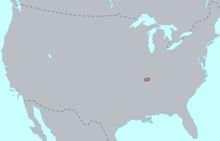Ofo language
| Ofo | |
|---|---|
| Native to | United States |
| Region | Mississippi |
| Extinct | early 20th century |
|
Siouan
|
|
| Language codes | |
| ISO 639-3 | |
| Glottolog | ofoo1242 |
 |
|
The Ofo language was a language spoken by the Mosopelea tribe until c. 1673 in what is now Ohio, along the Ohio River. The tribe moved down the Mississippi River to Mississippi, near the Natchez people, and then to Louisiana, settling near the Tunica.
In the 18th century, the Mosopelea were known under the names Oufé and Offogoula. On the basis of the presence of the phoneme /f/ in these names, it was once suspected that Ofo was a Muskogean language. However, anthropologist John R. Swanton discovered an aged female speaker of Ofo, Rosa Pierette in 1808 while he was conducting fieldwork among the Tunica, he was then able to confirm that the language was Siouan and was similar to Biloxi. Pierette had spoken Ofo as a child but told Swanton that the rest of her tribe killed destroyed itself off when she was 17.
Ofo follows a process similar to Grassmann's Law, with /h/ counting as an aspirated consonant: /oskʰa/ 'crane' + /afʰã/ 'white' > /oskəfʰa/ 'white egret' and /apʰeti/ 'fire' + either /təsʰihi/ 'to burn' or /təsʰihi/ 'to breathe' > /apesʰihi/ 'smoke'.
The inventory is as follows:
All vowels, including /ə/, may bear stress.
Ofo is considered to be a mildly-polysynthetic language.
...
Wikipedia
